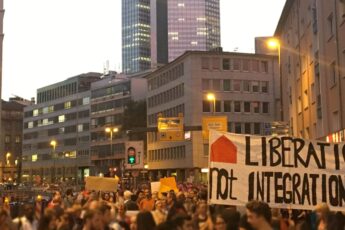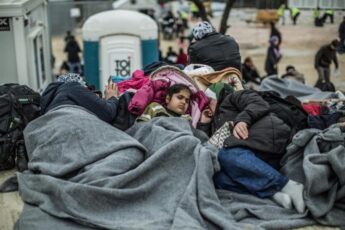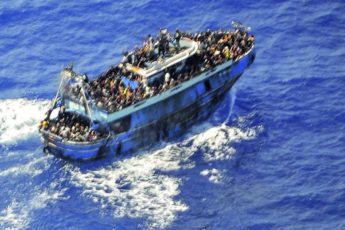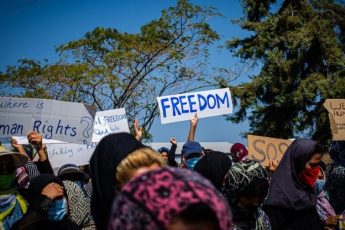
by COORDINAMENTO MIGRANTI BOLOGNA
On Sunday, 17 March, the well-established entente between Giorgia Meloni and Ursula von der Leyen gave further proof of stability. With a delegation also consisting of five other European heads of government, Meloni and von der Leyen travelled to Egypt to sign a 7.4-billion-euro pact with President Al Sisi for the next four years in exchange for a promise to prevent the movement of migrants. “Our goal is to manage nine million foreigners currently on our soil,” Al Sisi told the European leaders, who this time did not even dwell on ceremonial hypocrisy: not even a token mention of the old mantra of ‘human rights’, not even a condition for loans and billionaire aid. Rather, they preferred to hastily write out yet another blank cheque to an authoritarian and murderous regime, thus once again guaranteeing Italian and European investments and profits at the expense of millions of migrants, women and men. In the meantime, the Lampedusa hotspot once again exceeds its maximum capacity, and the Mediterranean does not cease to yield the bodies of dozens of people who have died of hunger, thirst, and burns, due to the Italian government’s policies against NGOs.
The Egypt pact is the latest in a long series of agreements whereby the EU has over the years agreed to lavishly pay dictators and authoritarian governments in its neighbourhood to enlist them as guardians of its borders. The increasingly extensive externalisation of the borders passes through the agreements with Erdogan’s Turkey, the continuous renewals of the memoranda with Tunisia and Mauritania, and the recent proposal of the EPP – supported by von der Leyen herself – to imitate the ‘Rwanda model’ experimented by England: deporting migrants abroad to manage their demands far from prying eyes. The European policy of externalisation also passes through autonomous initiatives of the member states, such as Italy’s Mattei plan or the pact that the Italian government has made with Albania to build detention centres on its territory that are exempt from all controls and rules. On the government of migrants, European leaders and the rising far right have come to an agreement for the slow and systematic destruction of the right to asylum, which should become a fait accompli with the approval of the reform of the Dublin system, ratifying the end of any possibility of regular access to Europe outside of ever smaller regulated quotas.
However, the agreement with Egypt is much more significant and ambitious. For now, Egypt is a transit rather than a departure country, but its economy has been brought to its knees by the effects of the Third World War. The conflict in Ukraine has hit wheat imports, Houthi attacks in the Red Sea have halved Suez Canal tariffs, and the country’s coffers are so strained that more and more Egyptians are trying to cross the Mediterranean via Tunisia. Above all, Egypt is the destination for millions of migrants fleeing the civil war in Sudan, and the only possible way out for Palestinian women and men affected by Israel’s genocidal war. That Egypt is preparing to handle a massive wave of refugees from Gaza is no longer a secret. With this agreement, Europe is ensuring that the axe of Al Sisi’s military state falls on the movement of thousands of men and women affected by the violence of war, so that their desire to rebuild their future elsewhere does not disturb European borders.
At the same time, the EU also ensures that investment capital for mega-projects for ‘clean’ energy production circulates freely and the need for cheap labour is met. The billion-dollar agreement with Egypt, in fact, combines the issue of migration with that of investments in ‘green transition’ energy policies, as well as the usual high-sounding proclamations about cooperation and the development of local investments. The umpteenth trip of a European delegation to North Africa clearly shows how the border regime that affects migrant men and women and the energy and climate agreements, the partnerships for trade, and the web of business that now make up the geography of relations between Europe and its neighbours is becoming increasingly intertwined with war. The other side of this externalisation is the opening of borders for capital.
These are processes and trends that come from afar, but which the war is accelerating in an unprecedented way. European countries such as France are climbing the ranks of weapons producers and exporters, and the EU itself is promoting plans to equip itself with a war industry and energy resources fit for purpose. An agreement like the one with Egypt also shows one of the truths of the new Europe at war: while massively reorganising production, trade, and financial channels, it violently attacks the claim to freedom of millions of migrant women and men who stubbornly continue to move to build a better life for themselves. Within Europe’s borders, this war is being fought against migrant labour, which is being called upon to pay the highest cost of all: housing, services and health care that are almost reduced to zero, overcrowded and unhealthy reception, intensified exploitation, impoverishment, and increasingly strict and diversified conditions according to country of origin and skin colour in order to obtain a residence permit that is increasingly precarious. For many, sending money to their families in their home countries, where the cost of living has risen with the war, means being forced to work starvation wages for twice as many hours. Europe’s new militarism thus translates internally into the imposition of ever more rigid hierarchies: from work to school, which the Italian education minister Valditara – with his speeches on merit and his proposal, later retracted, to set up separate classes for the daughters and sons of migrants – would like to turn into barracks.
That is why we cannot leave alone those who insist on crossing borders, who face racism and exploitation on a daily basis, who escape war and reject it. Their struggle can only be the struggle of everyone against Europe at war and against the war it has been waging for years against the freedom of and for migrants. Today, more than ever, standing on the side of and for migrants also means standing against war.





